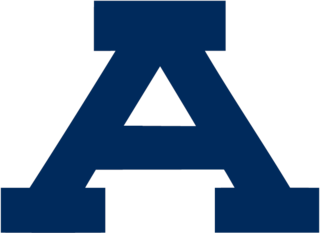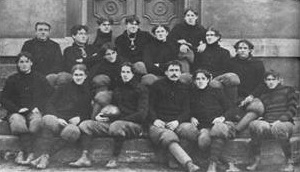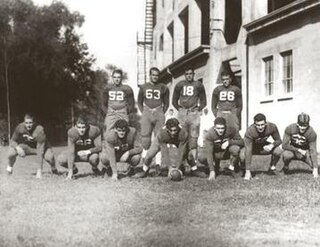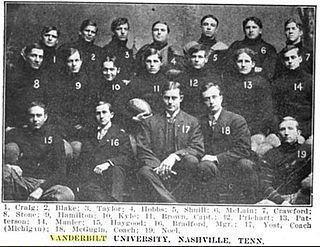
The 1908 Auburn Tigers football team represented Auburn University in the 1908 Southern Intercollegiate Athletic Association football season. The team went 6–1, outscoring opponents 158–10. Auburn featured a strong defense that held all but one opponent scoreless. The team was the first during the second term of coach Mike Donahue at Auburn.

The 1895 Georgia Bulldogs football team represented the University of Georgia during the 1895 Southern Intercollegiate Athletic Association football season. The Bulldogs competed as a member of the Southern Intercollegiate Athletic Association (SIAA) and completed the season with a 3–4 record, Georgia's first losing season. Georgia lost twice to North Carolina, and played Alabama for the first time.

The 1896 Georgia Bulldogs football team represented the University of Georgia during the 1896 Southern Intercollegiate Athletic Association football season. As a member of the Southern Intercollegiate Athletic Association (SIAA), the team provided Georgia with its first undefeated season, compiling a 4–0 record and defeating North Carolina for the first time. The Bulldogs were co-champions of the SIAA with LSU, who joined the conference in 1896.
The 1921 Georgia Bulldogs football team represented the University of Georgia during the 1921 college football season. This was the team's second season under the guidance of head coach Herman Stegeman. The Bulldogs had a 7–2–1 record, and were also co-champion of the Southern Intercollegiate Athletic Association: co-champions Georgia Tech and Vanderbilt were also undefeated. Vanderbilt tied Georgia with an onside kick in their game which decided conference title. The Bulldogs' only two losses came against two of the football powerhouses of the day, Eastern schools Harvard and Dartmouth.
The 1922 Georgia Bulldogs football team represented the University of Georgia during the 1922 college football season. The team had a 5–4–1 record and was the first Georgia team to compete in the newly formed Southern Conference, which was formed when a group of teams left the Southern Intercollegiate Athletic Association (SIAA) after the end of the 1921 season. This was Georgia's third and final season under the guidance of head coach Herman Stegeman, though he remained athletic director.
The 1927 Tennessee Volunteers football team represented the University of Tennessee in the 1927 Southern Conference football season. Playing as a member of the Southern Conference (SoCon), the team was led by head coach Robert Neyland, in his second year, and played their home games at Shields–Watkins Field in Knoxville, Tennessee. The 1927 Vols won eight, lost zero and tied one game. The only blemish on Tennessee's schedule was a tie with in-state rival, Vanderbilt. Playing seven home games, the 1927 Vols outscored their opponents 246 to 26 and posted seven shutouts.

The 1904 Vanderbilt Commodores football team represented Vanderbilt University during the 1904 Southern Intercollegiate Athletic Association football season. The team's head coach was Dan McGugin, who served his first season in that capacity. Members of the Southern Intercollegiate Athletic Association, the Commodores played six home games in Nashville, Tennessee and finished the season with a record of 9–0.
The 1898 Vanderbilt Commodores football team represented Vanderbilt University during the 1898 Southern Intercollegiate Athletic Association football season. Vanderbilt was in its ninth season of playing football, coached by R. G. Acton in his third and last year at Vanderbilt. Vanderbilt's 1898 record was 1–5. This was Vanderbilt's first losing season.

The 1931 Tulane Green Wave football team represented Tulane University during the 1931 Southern Conference football season. The team posted an undefeated regular season, but lost in the Rose Bowl to national champion USC. It is one of the best teams in school history.

The 1905 Vanderbilt Commodores football team represented Vanderbilt University during the 1905 Southern Intercollegiate Athletic Association football season. The team's head coach was Dan McGugin, who served his second season in that capacity. Members of the Southern Intercollegiate Athletic Association, the Commodores played six home games in Nashville, Tennessee and finished the season with a record 7–1 overall and 6–0 in SIAA, outscoring their opponents 372–22. Vanderbilt played seven home games and won them all including six shutout victories.
The 1907 Vanderbilt Commodores football team represented Vanderbilt University during the 1907 Southern Intercollegiate Athletic Association football season. The team's head coach was Dan McGugin, who served his fourth season in that capacity. Members of the Southern Intercollegiate Athletic Association, the Commodores played five home games in Nashville, Tennessee and finished the season with a record 5–1–1 and 3–0 in SIAA.

The 1921 Vanderbilt Commodores football team was an American football team representing Vanderbilt University during the 1921 Southern Intercollegiate Athletic Association football season. It was Dan McGugin's 17th season as head coach, and Wallace Wade's first season as assistant coach. Vanderbilt outscored its opponents 161–21 for a record of 7–0–1 and a share of the Southern Intercollegiate Athletic Association (SIAA) championship. The team's leading scorer was halfback Rupert Smith and its captain was "Pink" Wade, father of future Vanderbilt star Bill Wade. The Commodores played their home games at Dudley Field.

The 1924 Vanderbilt Commodores football team represented Vanderbilt University in the 1924 Southern Conference football season. The 1924 season was Dan McGugin's 20th year as head coach. Members of the Southern Conference, the Commodores played six home games in Nashville, Tennessee, at Dudley Field and finished the season with a record of 6–3–1. Vanderbilt outscored its opponents 150–53. Fred Russell's Fifty Years of Vanderbilt Football dubs it "the most eventful season in the history of Vanderbilt football."

The 1912 Vanderbilt Commodores football team represented Vanderbilt University in the 1912 college football season. The 1912 season was Dan McGugin's ninth year as head coach. Members of the Southern Intercollegiate Athletic Association (SIAA), the Commodores won their third straight conference title this year, posting an 8–1–1 win–loss–tie record. The team played its home games at Dudley Field. It used the short punt formation as its offensive scheme.
The 1916 Vanderbilt Commodores football team represented Vanderbilt University in the 1916 Southern Intercollegiate Athletic Association football season. The 1916 season was Dan McGugin's 13th year as head coach. Quarterback Irby Curry was selected third-team All-America by Walter Camp.
The 1919 Vanderbilt Commodores football team represented Vanderbilt University in the 1919 college football season. The 1919 season was Dan McGugin's 15th year as head coach. McGugin was returning from his stent in the Army during World War I where he was relieved by interim head coach Ray Morrison. Josh Cody was selected third-team All-America by Walter Camp, for the second time.
The 1927 Vanderbilt Commodores football team represented Vanderbilt University in the 1927 Southern Conference football season. The 1927 season was Dan McGugin's 23rd year as head coach. Running back Jimmy Armistead led the nation in scoring in 1927 with 138 points. The team's quarterback was Bill Spears. One fellow wrote Vanderbilt produced "almost certainly the legit top Heisman candidate in Spears, if there had been a Heisman Trophy to award in 1927."

The 1909 Sewanee Tigers football team represented Sewanee: The University of the South during the 1909 Southern Intercollegiate Athletic Association football season. The team was coached by Harris G. Cope in his 1st year as head coach, compiling a record of 6–1 and outscoring opponents 160 to 42 to win the Southern Intercollegiate Athletic Association title. Sewanee beat the previous season's champions LSU and Auburn, and upset rival Vanderbilt, handing the school its first loss to a Southern team in six years.

The 1923 Georgia Tech Golden Tornado football team represented the Georgia Tech Golden Tornado of the Georgia Institute of Technology during the 1923 college football season. Tech had ties in every one of its conference games.

The 1906 Georgia Tech Yellow Jackets football team represented the Georgia Institute of Technology during the 1906 Southern Intercollegiate Athletic Association football season. In the third season under coach John Heisman, Georgia Tech posted a 6–3–1 record.












